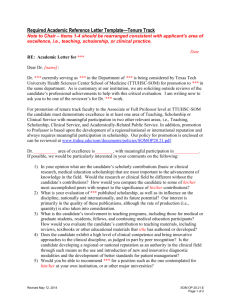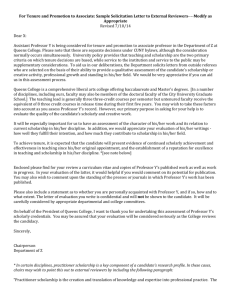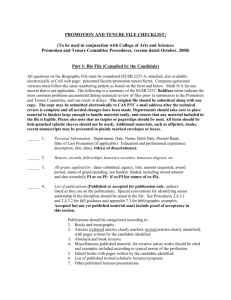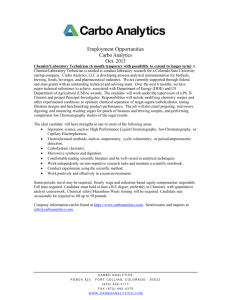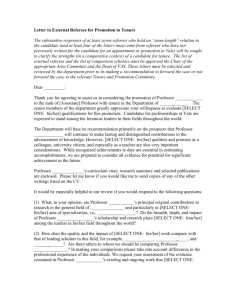Chemistry - Tenure and Promotion
advertisement
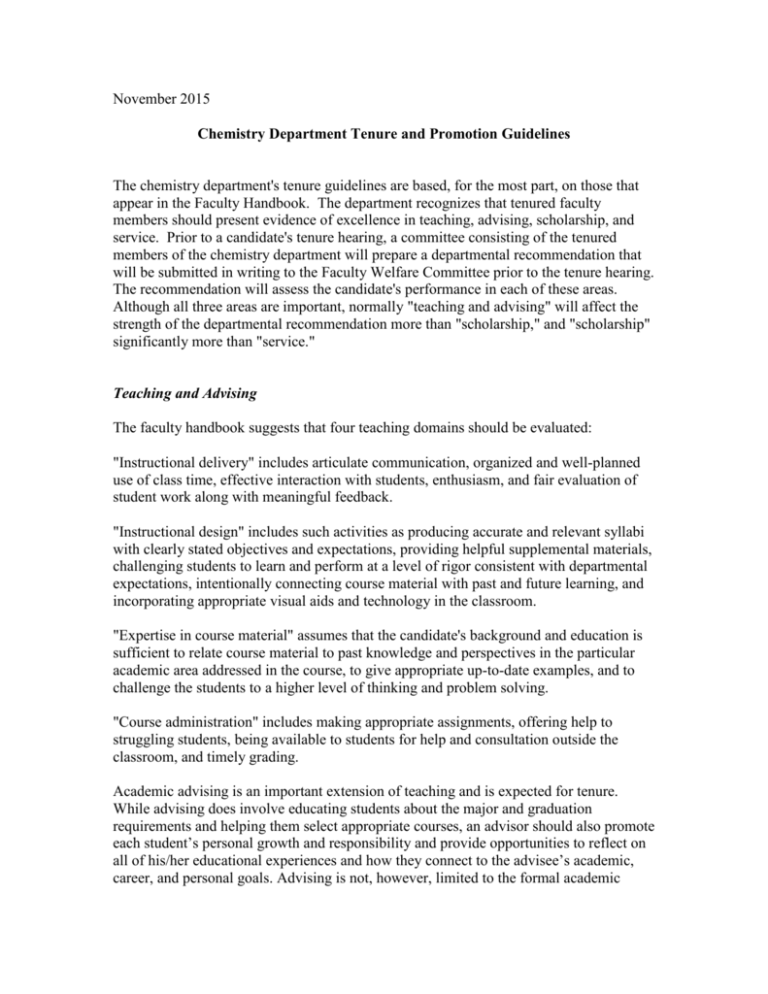
November 2015 Chemistry Department Tenure and Promotion Guidelines The chemistry department's tenure guidelines are based, for the most part, on those that appear in the Faculty Handbook. The department recognizes that tenured faculty members should present evidence of excellence in teaching, advising, scholarship, and service. Prior to a candidate's tenure hearing, a committee consisting of the tenured members of the chemistry department will prepare a departmental recommendation that will be submitted in writing to the Faculty Welfare Committee prior to the tenure hearing. The recommendation will assess the candidate's performance in each of these areas. Although all three areas are important, normally "teaching and advising" will affect the strength of the departmental recommendation more than "scholarship," and "scholarship" significantly more than "service." Teaching and Advising The faculty handbook suggests that four teaching domains should be evaluated: "Instructional delivery" includes articulate communication, organized and well-planned use of class time, effective interaction with students, enthusiasm, and fair evaluation of student work along with meaningful feedback. "Instructional design" includes such activities as producing accurate and relevant syllabi with clearly stated objectives and expectations, providing helpful supplemental materials, challenging students to learn and perform at a level of rigor consistent with departmental expectations, intentionally connecting course material with past and future learning, and incorporating appropriate visual aids and technology in the classroom. "Expertise in course material" assumes that the candidate's background and education is sufficient to relate course material to past knowledge and perspectives in the particular academic area addressed in the course, to give appropriate up-to-date examples, and to challenge the students to a higher level of thinking and problem solving. "Course administration" includes making appropriate assignments, offering help to struggling students, being available to students for help and consultation outside the classroom, and timely grading. Academic advising is an important extension of teaching and is expected for tenure. While advising does involve educating students about the major and graduation requirements and helping them select appropriate courses, an advisor should also promote each student’s personal growth and responsibility and provide opportunities to reflect on all of his/her educational experiences and how they connect to the advisee’s academic, career, and personal goals. Advising is not, however, limited to the formal academic 2 advisor-advisee relationships. Developing other one-on-one relationships with students such as research mentoring or providing guidance for future professional success in a student’s chosen field is also valuable. In order to evaluate a candidate's teaching performance in these domains, the departmental committee will consider the following sources of information: a. Student evaluation data IDEA survey data accumulated during the probationary years will be analyzed. In addition, during spring term prior to the tenure year, a detailed questionnaire will be distributed to former students in the candidate's courses, half chosen by the candidate and half chosen by the department Chair. Students will be selected from every section of every course that the candidate has taught, so that the sampling will usually include alumni. Insofar as possible, the list of students surveyed will be gender-balanced. The questionnaire allows respondents to assess, based on personal experience, the candidate's role as teacher, mentor, and scholar in both the chemistry department and in the college as a whole. Respondents are ultimately asked to choose one of the following responses to the question of whether the candidate should be granted tenure: "absolutely," "probably so," "uncertain," "probably not," or "absolutely not." b. Class visits During the two terms immediately preceding that of the tenure hearing, the department Chair and at least one other tenured member of the department will, on separate occasions, visit each of the candidate's classes. Typically one visit is made during the fourth week and another during the eighth week of the term. c. Evaluation of syllabi, exams, and supplementary materials. The tenure committee will expect a candidate's expectations of students to be consistent with the standards of the chemistry department and the College. d. Comparison of standardized test performance with national norms. Standardized tests are typically given as part of the final exam in CHEM 200 (Analytical Chemistry), CHEM313 (Organic Chemistry), CHEM 361 (Physical Chemistry I), CHEM 363 (Physical Chemistry III), CHEM 403 (Instrumental Chemistry), CHEM 412 (Biochemistry II), and CHEM 421 (Advanced Inorganic Chemistry). We have charted data for several years, comparing the mean scores of Augustana students in these courses with those of the national norms. In addition, an ETS exit exam may be given to graduating chemistry majors that measures learning in the areas of physical, organic, inorganic, and analytical chemistry. These data will be used as evidence of student learning for tenure candidates teaching in any of these areas. 3 In order to evaluate a candidate’s performance as an advisor, the department will consider the following information: a. The candidate’s advising philosophy which includes a description of advising goals and practices and strategies used to support students outside the classroom in planning and completing their degrees and/or preparing for post-graduate success. b. Number of students advised. c. Any other materials submitted by the candidate that provide evidence about the overall quality of his/her advising. Scholarship A chemistry faculty member at Augustana College should be engaged in significant scholarly pursuits that are publicly expressed. "Significance" will be judged by the extent to which professional expression improves the reputation of the College, makes the College more attractive to prospective top faculty candidates, and contributes to the Senior Inquiry program. The following activities will be considered as evidence of scholarship when the departmental tenure recommendation is written. a. Publication(s) in peer-reviewed journal(s) of research done under the supervision of graduate and post-doctoral advisers during graduate or post-doctoral training. b. Submission to an external funding agency of at least one peer-reviewed grant proposal that seeks significant financial support for the faculty member's research at Augustana College. c. At least one article accepted for publication in a peer-reviewed journal describing research in any field of chemistry or biochemistry, including scholarship of teaching and learning (SoTL), done after arriving at Augustana College. The publication(s) may be in collaboration with other researchers, but a substantial portion of the research described must have been conceived, proposed, and directed by the Augustana faculty member. Participation in the project by Augustana students eventually listed as co-authors of the publication is especially desirable. d. Serving as faculty advisor for at least three Senior Inquiry projects that culminate in student presentations at the college research fair (Celebration of Learning), a chemistry department seminar ("ChemChats"), or a professional meeting (e.g., 4 an American Chemical Society regional meeting or an undergraduate research symposium). e. A departmental seminar given during the first term of the tenure-decision year describing research performed with student(s). The seminar must be advertised campus-wide at least one week prior to the seminar date. f. Presentations of research at national conferences or regional meetings. g. Research seminars or colloquia presented, by invitation, at other institutions. h. Publication of externally reviewed textbook chapter(s). The chemistry department will ordinarily regard items 'a'–'e' (above) as essential, although the department will take into account extraordinary factors that might affect the extent of scholarship (e.g., extensive participation in the general education program, foreign terms, advising, administrative duties, and new course development). Service A candidate for tenure should have demonstrated a commitment to enhance the programs of both the chemistry department and the larger College community. Service to the profession and the public can provide enhancement to the candidate’s record of service. A chemistry department faculty member is expected to support, develop, and promote the department's curriculum and academic program and participate in governance activities within the department (e.g. service on departmental committees, outreach to prospective students). Campus service might include such activities as serving on College committees and task forces, serving on the Faculty Council, interacting with prospective students, acting as sponsor of a student group, teaching general education courses, working on college-wide curriculum development initiatives, and serving in other administrative roles at the request of the Dean or President. A tenure candidate should support the College's commitment to the liberal arts. Professional service includes representation of the College to the broader community of chemistry scholars and educators. Such service might include activities through professional organizations, review of disciplinary publications, or participation in program evaluations. Public service includes involvement in community activities related to the faculty member's professional role or in any civic activity that represents the College to members of the community in a positive way. 5 The departmental committee recognizes that the nature of service contributions will differ widely from person to person and will be difficult to measure quantitatively. For example, a short list of especially significant service-related activities could well be judged to constitute more impressive service than a longer list of less weighty activities. Despite the difficulty of making quantitative assessments, the committee expects the difference between especially significant and especially weak records of service to be apparent. Promotion from Associate to Full Professor The general expectations for recommendation of tenured department members for promotion to full professor are continued evidence of effective teaching, a record of ongoing scholarship, and service to the department and College as outlined in the tenure guidelines above. Teaching and Advising: A candidate for promotion to full professor should demonstrate consistent efforts to be an exemplary teacher and advisor. Some possible modes by which this can be established are listed in the tenure guidelines. Other measures of learning gains, as well as participation in activities for development and improvement of teaching pedagogy will also be considered. Scholarship: Ongoing participation in significant scholarly activity leading to publication, as described in the tenure guidelines, is expected. The merit of scholarly pursuits will be evaluated while taking into account the level of College support received by the candidate; expectations will be greater for those who have been granted start up monies and/or paid sabbatical, including pre-tenure paid leave. Service: As with a tenure candidate, service to the department and College is of primary importance. However, because of greater maturity and experience, it is expected that service of a candidate for promotion to full professor will be more leadership-oriented, such as leading the department, chairing a committee, and/or serving on a major committee. Other types of activities, such as professional and public service, are viewed as an enhancement to the service record.

